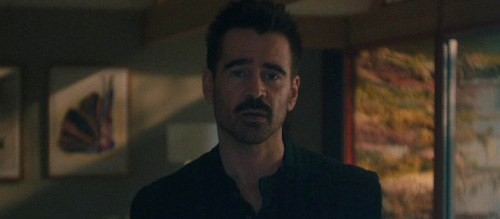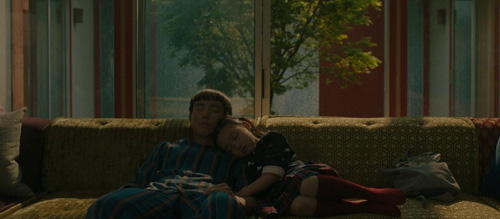After Yang (2022) Review
After Yang (2021)
Director: Kogonada
Screenwriter: Kogonada
Starring: Colin Farrell, Jodie Turner-Smith, Justin H. Min, Malea Emma Tjandrawidjaja, Haley Lu Richardson, Clifton Collins Jr.
Screenwriter-director Kogonada’s first commissioned work was his video essay “The World According to Koreeda Hirokazu“, which highlights the Shoplifters and The Truth director Hirokazu’s regular focus on everyday life. It seems clear that, through this, Koreeda is a particular influence on Kogonada’s work, Kogonada’s Columbus also focusing on human stories and everyday situations. His latest critically-lauded feature, After Yang, follows a similar trend, presenting an everyday story of grief.
After Yang is set at an undisclosed time in the future. Kogonada creates a beautiful and unique vision of what this future would look like, with an almost postmodern feel to it. However, importantly, we rarely get to see this vision, the director instead choosing to focus on the human side of the story. What we do see looks beautiful and incredibly interesting, but in deliberately covering this up and forcing our gaze and focus to stay upon what is happening in the story, Kogonada encourages an understanding that After Yang is less a film about the future and more a film about grief.
After Yang follows the Fleming family: father Jake Fleming (Colin Farrell), mother Kyra Fleming (Jodie Turner-Smith), their adopted Chinese daughter Mika Fleming (Malea Emma Tjandrawidjaja) and their son Yang Fleming (Justin H. Min). Yang is an artificially intelligent robot who was bought by the Flemings in order to make Mika feel more comfortable as an adopted child, and to keep her in touch with her Chinese heritage. One day, Yang becomes unresponsive and so Jake goes on a mission to ensure he is repaired. The film follows Jake whilst he goes through the five stages of grief: denial, anger, bargaining, depression, acceptance.
The way in which Kogonada presents this grief is both simple and elegant. Often, the frame makes use of wide open spaces to illustrate the emptiness that one feels whilst grieving. Benjamin Loeb’s camera frames the subjects in such a way to show the distance between the family during their time of grief. These seem like simple touches, yet there is a truth to them, an accuracy as regards how one feels when going through the unbelievable pain of losing someone. The editing of the film, from Kogonada himself, takes its time, allowing for shots to hang in the air and for characters to be alone with their thoughts.
The script is also worthy of praise, written with such bluntness that it is almost reminiscent of the work of Yorgos Lanthimos (someone lead star Colin Farrell has worked with multiple times – director of The Lobster and The Favourite). Like in Lanthimos’ work, the dialogue is blunt and seems straightforward, but this is a screenplay that is filled with subtext – what the characters aren’t saying always seems to be much more important than what they are saying, and it is this silence that packs the heaviest punch.

Kogonada crafts a wonderful movie about one of the most painful experiences one can go through, yet After Yang is ultimately encapsulated by the wonderful score by Aska Matsumiya. In particular, Matsumiya’s “breath” quadrilogy, which is made up of four different versions of the same composition (“In My Breath”, “In the World of My Breath”, “In My Breath Again” and “The End Walk”). It is this contribution that truly hits home the feelings that the family are going through and almost forces you to feel the same way. The composition is filled with nostalgia and longing, and even if you have never gone through the pain of losing someone, these tracks will fill you with all of those feelings and then some.
Perhaps the film’s greatest moment is when we see flashbacks to the memory of Yang. Each day of his life is shown in three-second intervals of what Yang deemed to be the most human: nature, watching the Fleming family interact from afar, family photos, light, himself. The way in which it is shown, as well as how it is shown, is reminiscent of a photo album. It’s as if looking back over the memories and moments you had with someone before they were gone.
After Yang is an exceptionally beautiful film from Kogonada; one that is masterfully told. It will manipulate you into feeling the five stages of grief and will ultimately guide you through a truly cathartic experience. You can be promised that you will be thinking of After Yang for a long time after the credits roll, and that Matsumiya’s “breath” quadrilogy will forever have a direct line to your tear ducts.
Score: 20/24


